Related Research Articles

Leo Jeremiah O'Donovan III is an American Catholic priest, Jesuit, and theologian who served as the president of Georgetown University from 1989 to 2001. Born in New York City, he graduated from Georgetown, and while studying in France, decided to enter the Society of Jesus. He went on to receive advanced degrees from Fordham University and Woodstock College, and received his doctorate in theology from the University of Münster, where he studied under Karl Rahner. Upon returning to the United States, he became a professor at Woodstock College and the Weston Jesuit School of Theology, before becoming the president of the Catholic Theological Society of America and a senior administrator in the Jesuit Maryland Province.

Woodstock College was a Jesuit seminary that existed from 1869 to 1974. It was the oldest Jesuit seminary in the United States. The school was located in Woodstock, Maryland, west of Baltimore, from its establishment until 1969, when it moved to New York City, where it operated in cooperation with the Union Theological Seminary and the Jewish Theological Seminary.
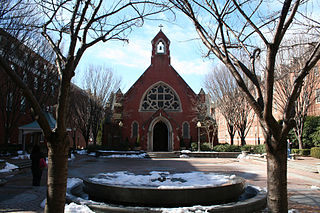
The history of Georgetown University spans nearly four hundred years, from the early European settlement of America to the present day. Georgetown University has grown with both its city, Washington, D.C., and the United States, each of which date their founding to the period from 1788 to 1790. Georgetown's origins are in the establishment of the Maryland colony in the seventeenth century. Bishop John Carroll established the school at its present location by the Potomac River after the American Revolution allowed for free religious practice.

The Campuses of Georgetown University, the Law School Campus, the Main Campus, and the Medical Campus, are located within Washington, D.C. Georgetown's Main and Medical Campuses are located in Georgetown, Washington, D.C. between Canal Road, Prospect Street, and Reservoir Road. The Law Campus is located in downtown DC on New Jersey Avenue, near Union Station. Other parts of Georgetown are located in the D.C. Area, including the Center for Continuing and Professional Education at Clarendon in Arlington, Virginia. Georgetown also has an overseas campus in Education City, Qatar, and villas in Alanya, Turkey and Fiesole, Italy.

Giovanni Antonio Grassi was an Italian Catholic priest and Jesuit who led many academic and religious institutions in Europe and the United States, including Georgetown College in Washington, D.C., and the Pontificio Collegio Urbano de Propaganda Fide in Rome.

Gerard John Campbell was an American Catholic priest, Jesuit, and historian who became the president of Georgetown University. Born in Pennsylvania, he entered the Society of Jesus at the age of 20 and studied at West Baden College and Fordham University, before earning his doctorate at Princeton University. A promising historian, he then taught at Loyola University Maryland, before becoming the executive vice president of Georgetown University in 1963, where he effectively worked as acting president.

The Georgetown University Library is the library system of Georgetown University in Washington, D.C. The library's holdings now contain approximately 3.5 million volumes housed in seven university buildings across 11 separate collections.
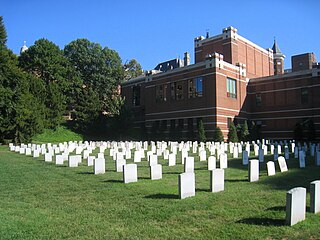
The Jesuit Community Cemetery on the campus of Georgetown University in Washington, D.C., is the final resting place for Jesuits who were affiliated with the university. It was first established in 1808 and was moved to its present location in 1854.
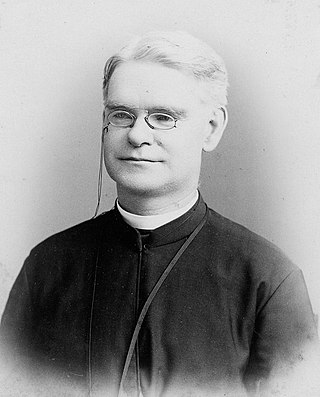
James Aloysius Doonan was an American Catholic priest and Jesuit, who was the president of Georgetown University from 1882 to 1888. During that time he oversaw the naming of Gaston Hall and the construction of a new building for the School of Medicine. Doonan also acquired two historic cannons that were placed in front of Healy Hall. His presidency was financially successful, with a reduction in the university's burdensome debt that had accrued during the construction of Healy Hall.
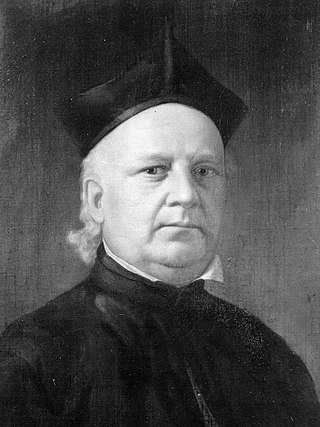
James A. Ryder was an American Catholic priest and Jesuit who became the president of several Jesuit universities in the United States. Born in Ireland, he immigrated with his widowed mother to the United States as a child, to settle in Georgetown, in the District of Columbia. He enrolled at Georgetown College and then entered the Society of Jesus. Studying in Maryland and Rome, Ryder proved to be a talented student of theology and was made a professor. He returned to Georgetown College in 1829, where he was appointed to senior positions and founded the Philodemic Society, becoming its first president.

Joseph Havens Richards was an American Catholic priest and Jesuit who became a prominent president of Georgetown University, where he instituted major reforms and significantly enhanced the quality and stature of the university. Richards was born to a prominent Ohio family; his father was an Episcopal priest who controversially converted to Catholicism and had the infant Richards secretly baptized as a Catholic.
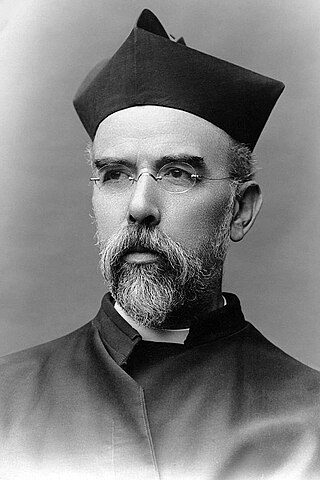
Joseph J. Himmel was an American Catholic priest and Jesuit. For much of his early life, he was a missionary throughout the northeast United States and retreat master. Later in life, he was president of Gonzaga College and Georgetown University in Washington, D.C.
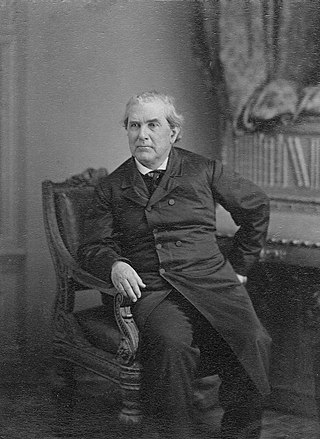
Charles Henry Stonestreet was an American Catholic priest and Jesuit who served in prominent religious and academic positions, including as provincial superior of the Jesuit Maryland Province and president of Georgetown University. He was born in Maryland and attended Georgetown University, where he co-founded the Philodemic Society. After entering the Society of Jesus and becoming a professor at Georgetown, he led St. John's Literary Institution and St. John the Evangelist Church in Frederick, Maryland. He was appointed president of Georgetown University in 1851, holding the office for two years, during which time he oversaw expansion of the university's library. The First Plenary Council of Baltimore was held at Georgetown during his tenure.
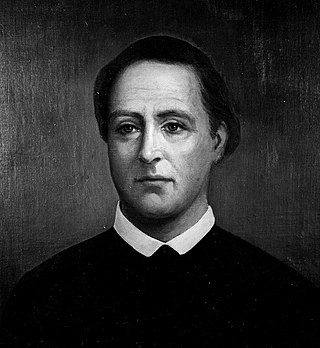
William McSherry was an American Catholic priest and Jesuit who became the president of Georgetown College and a Jesuit provincial superior. The son of Irish immigrants, McSherry was educated at Georgetown College, where he entered the Society of Jesus. As one of the first Americans to complete the traditional Jesuit course of training, he was sent to Rome to be educated for the priesthood. There, he made several discoveries of significant, forgotten holdings in the Jesuit archives, which improved historians' knowledge of the early European settling of Maryland and of the language of Indian tribes there.

William Feiner was a German Catholic priest and Jesuit who became a missionary to the United States and eventually the president of Georgetown College, now known as Georgetown University.

Jerome Daugherty was an American Catholic priest and Jesuit who served in many different capacities at Jesuit institutions throughout the northeast United States, eventually becoming president of Georgetown University in 1901. Born in Baltimore, he was educated at Loyola College in Maryland, before entering the Society of Jesus and becoming a member of the first class at Woodstock College. He then taught various subjects, including mathematics, Latin, Ancient Greek, rhetoric, and the humanities in Massachusetts, New York City, and Washington, D.C., and served as minister at many of the institutions there.

John Dunning Whitney was an American Catholic priest and Jesuit who became the president of Georgetown University in 1898. Born in Massachusetts, he joined the United States Navy at the age of sixteen, where he was introduced to Catholicism by way of a book that accidentally came into his possession and prompted him to become a Catholic. He entered the Society of Jesus and spent the next twenty-five years studying and teaching mathematics at Jesuit institutions around the world, including in Canada, England, Ireland, and around the United States in New York, Maryland, Boston, and Louisiana. He became the vice president of Spring Hill College in Alabama before being appointed the president of Georgetown University.

John Berchmans Creeden was an American Catholic priest and Jesuit, who served in many senior positions at Jesuit universities in the United States. Born in Massachusetts, he attended Boston College, and studied for the priesthood in Maryland and Austria. He taught at Fordham University and then at Georgetown University, where he became the dean of Georgetown College in 1909, and simultaneously served as the principal of Georgetown Preparatory School.
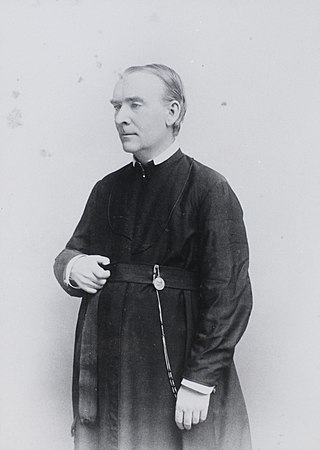
Edward Ignatius Devitt was a Canadian American priest, Jesuit, and historian of the American Catholic Church. Born in Saint John, New Brunswick, he moved with his family to Boston, Massachusetts, at a young age. He studied in public schools in the city before enrolling at the College of the Holy Cross. Devitt spent two years there, and then entered the Society of Jesus in 1859. He studied at the novitiate in Frederick, Maryland, and at the newly opened Woodstock College. He briefly taught at the Washington Seminary during his studies, and after graduating, was a professor for the next thirty years at Holy Cross, Woodstock, and Georgetown University.
References
- 1 2 "History of the Woodstock Theological Center". Woodstock Theological Center. Retrieved 2013-07-17.
- ↑ Becker, Joseph M. (1992). Re-Formed Jesuits: A History of Changes in Jesuit Formation During the Decade 1965-1975. Ignatius Press. pp. 136–137. ISBN 978-0-89870-402-0.
- ↑ Dulles, Avery (1996). A Testimonial to Grace and, Reflections on a Theological Journey. Rowman & Littlefield. pp. 119–120. ISBN 978-1-55612-904-9.
- ↑ "Woodstock Theological Center". Washington Theological Consortium. Retrieved 2013-07-17.
- ↑ Oka, Hiromi (February 18, 2013). "Woodstock Center to Close". The Hoya . Retrieved 2013-07-17.
- ↑ "Woodstock Theological Center Closed". Woodstock Theological Center. July 1, 2013. Retrieved 2013-07-17.
